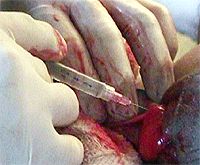Anesthetic
Anesthetics (also anaesthetics, anaesthetic) are used to numb flesh in order to reduce the pain or discomfort that may be caused by many body modifications. Local anesthetics used in body modification tend to fall into two main categories: topical anesthetics (such as EMLA Cream) and injectable anesthetics (such as xylocaine). Some practitioners also use spray anesthetics that operate by flash-freezing local tissue. General anesthesia is rarely (if ever) used by non-medical practitioners, due to the level of danger and support involved.
The vast majority of piercers and tattoo artists agree that anesthetics are not appropriate, or needed, for the procedures they perform, and many enthusiasts feel that pain is an important part of the process of getting modifications. They may consider that a tattoo has less value, in some way, if you didn't go through the pain, although many others would disagree with that.
In addition, it's important to note that injectable anesthetics are almost always not legal for non-medical practitioners to administer. While they're not necessarily "illegal", it's rare to find areas where they are legal, strictly speaking. Topical anesthetics are more commonly legal to use, due to their less invasive nature.
